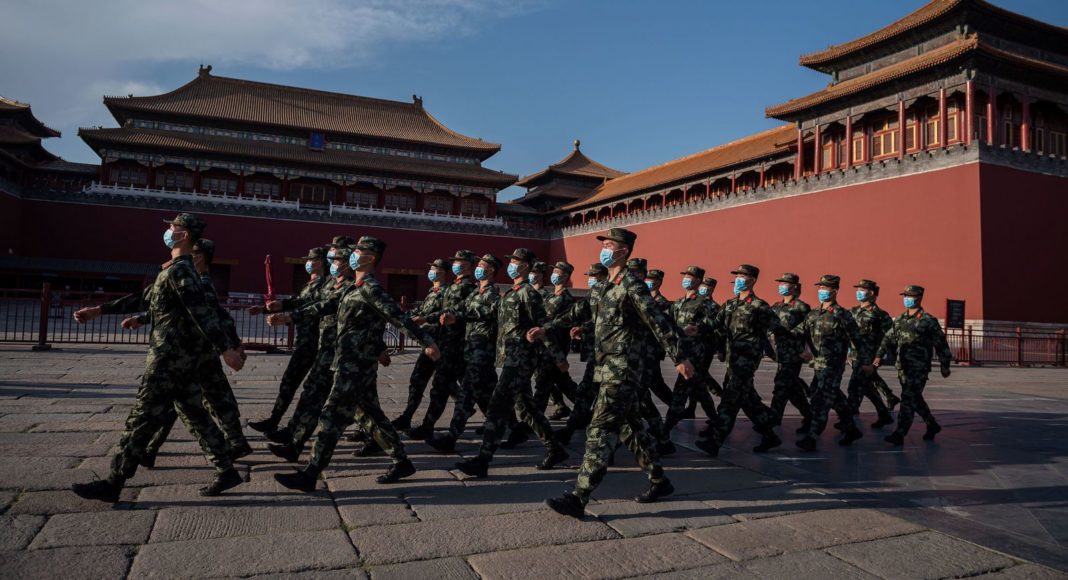The National People’s Congress, the annual meeting of China’s legislature, has begun.
Although the NPC is largely toothless, the meeting is still an important piece of political theatre where Chinese leaders publicly summarise the work of the last year and set goals for the next.
This year’s meeting was delayed – for the first time since the Cultural Revolution – by two months because of COVID-19 and will be a truncated session. Delegates have undergone nucleic acid testing and quarantine to meet in the Great Hall of the People on Tiananmen Square.
China’s response to the pandemic will be front and centre. But the economy, including GDP targets, and the unrest in Hong Kong will also feature. What can we expect over the course of the week?
Image:
Delegates for the NPC outside the Great Hall of the People in Beijing
What is the NPC?
The NPC is formally the most powerful organ in the Chinese state.
In practice, it does little more than publicly ratify plans already devised by the Communist Party – bills are rarely amended, let alone rejected.
Nearly 3,000 delegates from China’s provinces and armed forces constitute the congress.
Image:
Xi Jinping at a session of the NPC earlier this month
Will COVID-19 feature?
The fact that the NPC is itself going ahead is a deliberate, public signal that China is getting back to business.
China’s response to coronavirus will feature heavily.
By now, Beijing has settled on its preferred narrative – that after some initial mistakes, by local, not central government, China was able to tame the outbreak thanks to the leadership of the Chinese Communist Party and the sacrifices of the Chinese people.
Or as Premier Li Keqiang put it in his Work Report, the public address that kicks off the NPC: “General Secretary Xi Jinping, putting the health and safety of our people before everything else, has personally taken charge and planned our response”, achieving “a decisive victory in the battle to defend Hubei province”.
The NPC will likely draw a contrast between China’s response and that of Western countries.
Image:
The NPC is an important piece of political theatre in China and the COVID-19 response will be at the forefront
What about the economy?
Li Keqiang said China’s response to COVID-19 has come at a “a great price”.
In the first quarter of this year, GDP shrunk by 6.8% year on year – the first contraction since the 1970s.
And COVID-19 is still taking its toll on the economy: domestic consumption is still lower than it should be and the global pandemic means demand for China’s exports is weak.
As a result, China has made the important move to scrap its GDP targets because of “the great uncertainty regarding the COVID-19 pandemic and the world economic and trade environment”, Li announced.
No other country uses a target: GDP is instead a measure of growth. Every year since 1990, though, the NPC has set the target for the next year’s growth and, every year, China has officially achieved this. Setting a low target this year may not have been politically appetising, though, so it was junked altogether.
“Not setting a specific target for economic growth will enable all of us to concentrate on ensuring stability,” Li said.
This is something many have long argued China should do anyway: targets encourage local officials to do everything in their means to achieve the required growth, even if it means wasteful spending and excessive borrowing, or environmental destruction.
November: Protesters defy order and clash with police in Hong Kong
Where does Hong Kong fit in?
Unrest in Hong Kong is a priority for the Chinese leadership after last year’s protests. This year, the Hong Kong government, with the backing of Beijing, has been trying to reassert its grip while COVID-19 restrictions have been keeping people off the streets.
The NPC looks set to go much further, though. China has proposed new national security legislation for Hong Kong. The legislation would proscribe secessionist and subversive activity, and foreign interference and terrorism in the city “or any acts that severely endanger national security”.
This would be a huge and doubtless incendiary step. Article 23 of Hong Kong’s Basic Law – the mini-constitution adopted at the time of its handover from the UK in 1997 – stipulates that a national security law should be passed.
This has never come to pass and attempts to do so in 2003 prompted huge protests. Critics fear that national security laws could jeopardise other rights enshrined in the Basic Law, especially freedom of speech, association and assembly.
Beijing had been content to leave the legislation to Hong Kong itself – and the Basic Law says that Chinese national laws shall not be applied to Hong Kong apart from some limited exceptions.
To intervene so directly would be deeply significant and seen by many as further erosion of Hong Kong’s unique rights.




